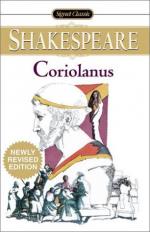|
This section contains 6,049 words (approx. 16 pages at 400 words per page) |

|
Coppelia Kahn has examined the juxtaposition of masculine and feminine in the play's combined imagery of nursing and war. According to Kahn's view, the ending of Coriolanus takes on an ironic tone as one realizes that Volumnia's maternal power results in the contradictions of Coriolanus's manhood and makes him an enemy of Rome, thereby bringing about his destruction. G. Wilson Knight has also focused on the relationship between the Roman matron and her son. Knight proposed that the hero's failure to recognize the value of love is the source of his tragedy and that his relationship with his mother is based on shared pride rather than affection. Moreover, Knight noted, this pride ultimately causes the two characters to oppose each other. Significantly, the critic interpreted Coriolanus's yielding to Volumnia in Act V, scene iii as the triumph of love over pride.
Harold C. Goddard has scrutinized Volumnia's...
|
This section contains 6,049 words (approx. 16 pages at 400 words per page) |

|




